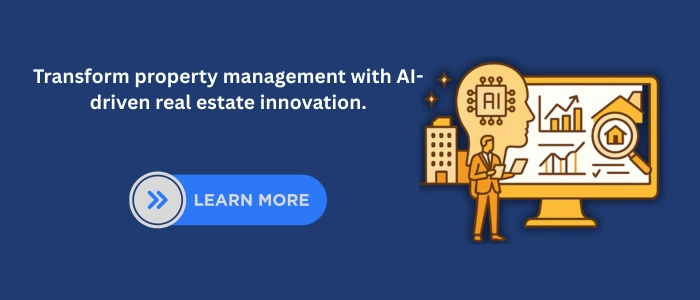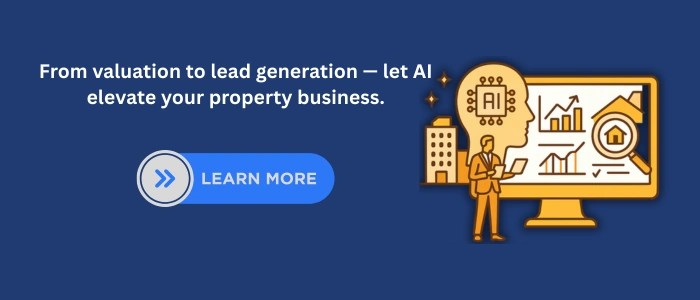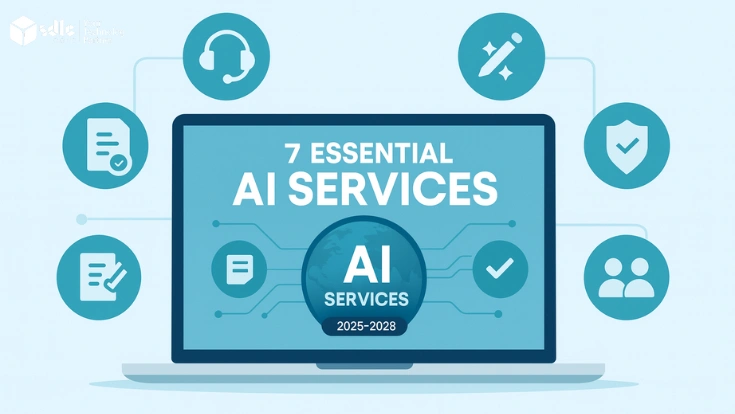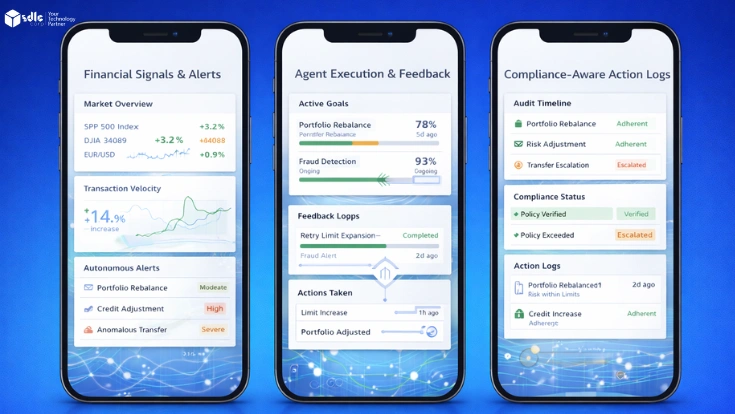Introduction
AI for Real Estate Startups is reshaping how the property sector operates. Startups today rely on data-driven intelligence rather than intuition. Artificial Intelligence allows them to forecast trends, optimize operations, and personalize customer experiences. This technology is not just improving efficiency but also helping startups make faster, evidence-based decisions.
AI models process data from listings, customer interactions, and regional markets to reveal actionable insights. As a result, startups can price properties more accurately, predict demand shifts, and understand buyer preferences. With the help of real estate AI solutions, many small firms now compete effectively against established players.
Startups that brand themselves as an AI real estate startup leverage predictive analytics, image recognition, and automation to manage assets more efficiently. These tools eliminate repetitive tasks, enhance client engagement, and deliver consistent results.
AI also reduces operational errors. For example, automated valuation systems evaluate market data and detect outliers that manual processes often overlook. Predictive tools estimate the best times to buy or sell properties. Combined, these systems bring clarity, speed, and intelligence to the entire process.
Role of AI in Modern Real Estate

Artificial Intelligence changes how startups interact with data, clients, and properties. It improves accuracy, saves time, and reduces human bias. The following are key ways AI strengthens operations in real estate:
- Property Search Optimization: AI platforms scan thousands of listings in seconds and match users with properties that fit their preferences.
- Market Forecasting: Predictive models identify where prices will rise or fall. Startups gain an edge by acting before the competition.
- Customer Experience: Chatbots and virtual assistants handle queries instantly, offering recommendations and follow-ups.
- Fraud Detection: Machine learning checks transaction data to identify suspicious activity.
In addition, real estate AI solutions enable smart pricing and marketing personalization. They track audience behavior, test campaigns, and direct efforts toward high-value leads. As a result, startups save money and improve conversions.
The adoption of AI ensures that startups make faster and more reliable decisions. It reduces guesswork and supports a data-first culture that sustains growth.
Learn how SDLC Corp uses AI to streamline property operations
Machine Learning in Real Estate Startups

Machine learning forms the backbone of modern real estate analytics. It allows startups to make predictions based on patterns within data, which improves over time as the system learns.
- Predictive Modeling: Algorithms forecast future property values by analyzing historical sales, interest rates, and neighborhood growth.
- Automation: Routine tasks such as data entry and document verification are automated, freeing employees to focus on high-value work.
- Marketing Insights: Systems segment customers and identify which audience groups respond best to campaigns.
- Operational Efficiency: ML tools optimize supply chains for construction materials and predict project delays before they happen.
Startups using machine learning for real estate startups not only gain accuracy but also speed. They rely on data instead of intuition, which results in better investment outcomes.
Machine learning also empowers smarter financial decisions. Algorithms review mortgage histories and payment records to detect potential risks. By acting on these insights, startups maintain a stable and secure portfolio.
AI for Property Valuation and Risk Assessment

Accurate valuation is crucial for every real estate transaction. Traditional appraisals can be inconsistent, relying on outdated data or subjective judgment. With AI property valuation algorithms, startups assess properties in real time using a combination of market data, geographic information, and visual inputs.
- Image Analysis: AI examines property photos to estimate renovation needs or detect structural issues.
- Document Verification: Natural language models scan legal records to verify ownership and identify red flags.
- Comparative Analytics: Systems compare multiple data points from similar properties to determine fair market value.
AI also improves risk assessment. It evaluates local regulations, environmental hazards, and investment trends. This reduces uncertainty for both investors and customers.
By integrating automated valuation and risk models, startups reduce processing times and enhance client trust. Transparent pricing builds credibility and attracts serious buyers.
AI-Driven Real Estate Lead Generation

Lead generation is often costly and inefficient in traditional real estate models. AI changes that by identifying high-potential clients and improving marketing precision.
Startups using AI-driven real estate lead generation tools can:
- Analyze customer behavior and financial profiles to predict buying intent.
- Use chatbots to manage inquiries instantly, improving client engagement.
- Automate follow-ups and appointment scheduling without manual input.
- Rank prospects based on likelihood to convert, optimizing sales efforts.
In addition, AI tracks ad performance across digital channels and reallocates budgets to maximize return on investment. This ensures that startups focus on qualified leads rather than random traffic.
As a result, real estate startups not only attract more customers but also convert them faster. This smart automation drives measurable business growth.
AI in Property Technology (AI PropTech)
Before implementation, many real estate startups benefit from structured planning and governance around AI technologies. Working with a AI consulting company helps align the business strategy with data readiness, model selection, and ethical considerations ensuring solutions support long-term growth objectives.
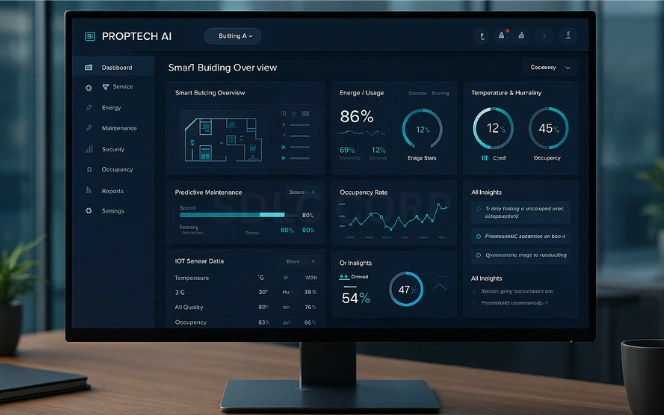
The rise of AI in property technology (AI proptech) has introduced a new level of efficiency in how buildings are designed, managed, and maintained. Startups use these systems to improve sustainability and enhance tenant experience.
Applications include:
- Smart Building Management: AI adjusts lighting, temperature, and energy use based on occupancy data.
- Predictive Maintenance: Sensors detect early equipment faults, reducing downtime and costs.
- Digital Twins: Virtual models simulate performance before construction begins, allowing better planning.
- Tenant Services: AI assistants handle rent payments, maintenance requests, and real-time updates.
PropTech startups that combine AI and IoT deliver intelligent environments that respond to human behavior. This reduces waste, improves comfort, and adds measurable value.
Benefits and Challenges of AI Adoption
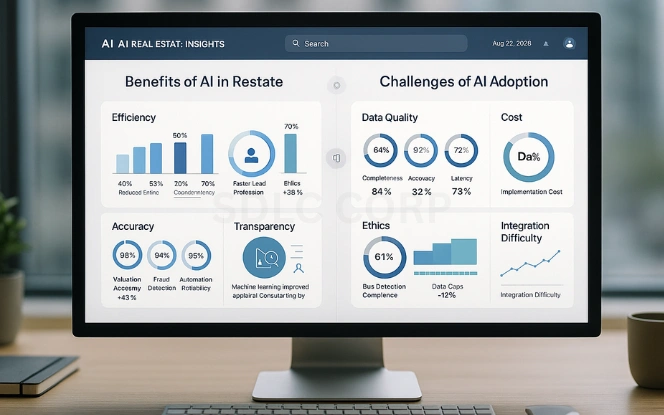
Key Benefits
Efficiency: Automation accelerates operations and lowers administrative effort.
Accuracy: Data-driven systems improve valuations and reduce pricing errors.
Personalization: AI tailors services based on user behavior and market demand.
Transparency: Automated reports enhance client confidence in every transaction.
Main Challenges
Data Quality: Incomplete or inaccurate records can affect model performance.
Integration Costs: Smaller startups may struggle with initial setup expenses.
Ethical Concerns: Data privacy and algorithmic bias must be managed carefully.
However, most barriers are temporary. Cloud-based tools are reducing costs, and improved regulations support ethical AI use. As adoption grows, startups that maintain clear standards and transparency will stand out.
Future of AI in Real Estate Startups
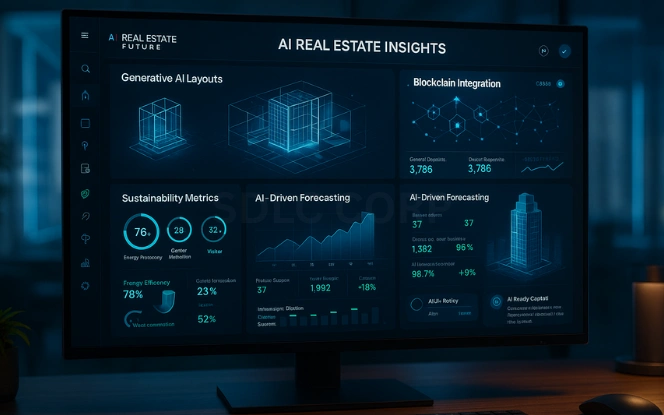
AI will continue to evolve, offering more advanced applications each year. Future models will simulate buyer journeys, predict market shifts, and automate end-to-end property transactions.
Emerging trends include:
- Generative AI: Used to design 3D property layouts and marketing visuals.
- Blockchain Integration: Enhances transaction security and transparency.
- AI-Driven Sustainability: Models that monitor and reduce carbon footprints in buildings.
- Hybrid Systems: Combining human expertise with automated intelligence for strategic accuracy.
Startups that invest early in AI infrastructure will dominate this new ecosystem. Those that ignore it risk losing market relevance. The future belongs to those who adapt quickly and maintain a strong data-driven approach.
Enterprise-Grade Architecture for Property Intelligence
As real estate startups grow, data and AI workloads increase in complexity. Enterprise-level frameworks help manage scale, compliance, and user access in multi-tenant environments. Design patterns and infrastructure guidance from an enterprise AI development company support robust, scalable, and maintainable architectures.
Conclusion
AI has become essential for real estate startups aiming to grow in a data-centric world. It improves efficiency, strengthens decision-making, and enhances customer experience. Startups that integrate real estate AI solutions or operate as an AI real estate startup gain measurable competitive advantages.
With automation, predictive modeling, and intelligent analytics, startups can optimize property management and elevate service quality.
Contact us SDLC Corp to explore how AI can transform your real estate business. Hire AI Development Services with SDLC Corp to build scalable, intelligent solutions that keep your startup ahead of the market.
FAQs
How Does Artificial Intelligence Improve Real Estate Efficiency?
AI automates listing management, pricing, and customer communication. It predicts demand, detects fraud, and reduces manual workload.
What Role Does Machine Learning Play in Real Estate Startups?
Machine learning powers predictive analytics and automates time-consuming tasks. Startups using machine learning for real estate startups gain faster insights and better forecasts.
How Do AI Property Valuation Algorithms Work?
AI property valuation algorithms assess property data, location details, and market trends to produce accurate valuations within seconds.
What Is AI-Driven Real Estate Lead Generation?
AI-driven real estate lead generation identifies potential buyers through data analysis and automates follow-ups to improve conversions.
How Can Startups Benefit from AI in Property Technology?
AI in property technology (AI proptech) improves sustainability and maintenance efficiency while enhancing tenant satisfaction and asset performance.

